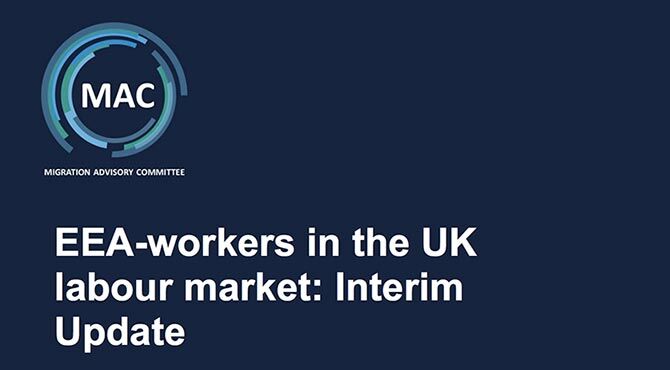UK Immigration Update: Summary of the latest MAC report
The UK government's Migration Advisory Committee (MAC) has released its interim report on EU/EEA migration to the UK.

General reasons for EU migration to the UK
UK businesses stated that they employ EEA migrants because they are the best possible applicants for the job. Employers do not go out of their way to seek out non-UK employees. There are distinct differences in skills levels which means that, sometimes, EU migrants are the best candidates for employment for some jobs. Among the reasons employers found that migrants could be better for the job:- the necessary skills are scarce among the UK-born workforce
- migrants often have a higher motivation to work so are more productive and
- reliable
- migrants are prepared to do jobs in difficult conditions that the UK-born workforce
- are not interested in
- low unemployment means a low supply of UK-born workers.
Skills shortages: key factor in inward UK immigration
Employers in the UK have reported skills shortages are a contributing factor to continuing to employe EEA migrants in the UK. These skills shortages exist in low-, medium- and high-skilled jobs. Some employers expressed concern that workers in what are perceived to be lower-skilled jobs would not be eligible for work permits if the current non-EEA Tier 2 system was extended to EEA migrants who were not classified as sufficiently skilled.Related articlesSurvey: Impact of Brexit on EU citizens in the UKBrexit migration curbs would 'very likely' hit output - MAC reportMAC interim immigration report: senior labour analyst at CIPD comments
Immigration and UK population growth
The MAC received responses to their Call for Evidence from the devolved administrations in the UK and other regional public bodies. One issue raised by these groups is the contribution of EEA migrants to population growth. Office of National Statistics (ONS) projections suggest that with EU net migration to the UK at zero, the population in Scotland, Wales and Northern Ireland would stop growing or even fall in the next 20 years. It is projected this would also happen in the northern regions of England.Check back soon as Relocate Global will provide more coverage of this latest interim MAC report.
For related news and features, visit our Brexit section. Relocate’s new Global Mobility Toolkit provides free information, practical advice and support for HR, global mobility managers and global teams operating overseas.
 Access hundreds of global services and suppliers in our Online Directory
Access hundreds of global services and suppliers in our Online Directory
©2025 Re:locate magazine, published by Profile Locations, Spray Hill, Hastings Road, Lamberhurst, Kent TN3 8JB. All rights reserved. This publication (or any part thereof) may not be reproduced in any form without the prior written permission of Profile Locations. Profile Locations accepts no liability for the accuracy of the contents or any opinions expressed herein.









































